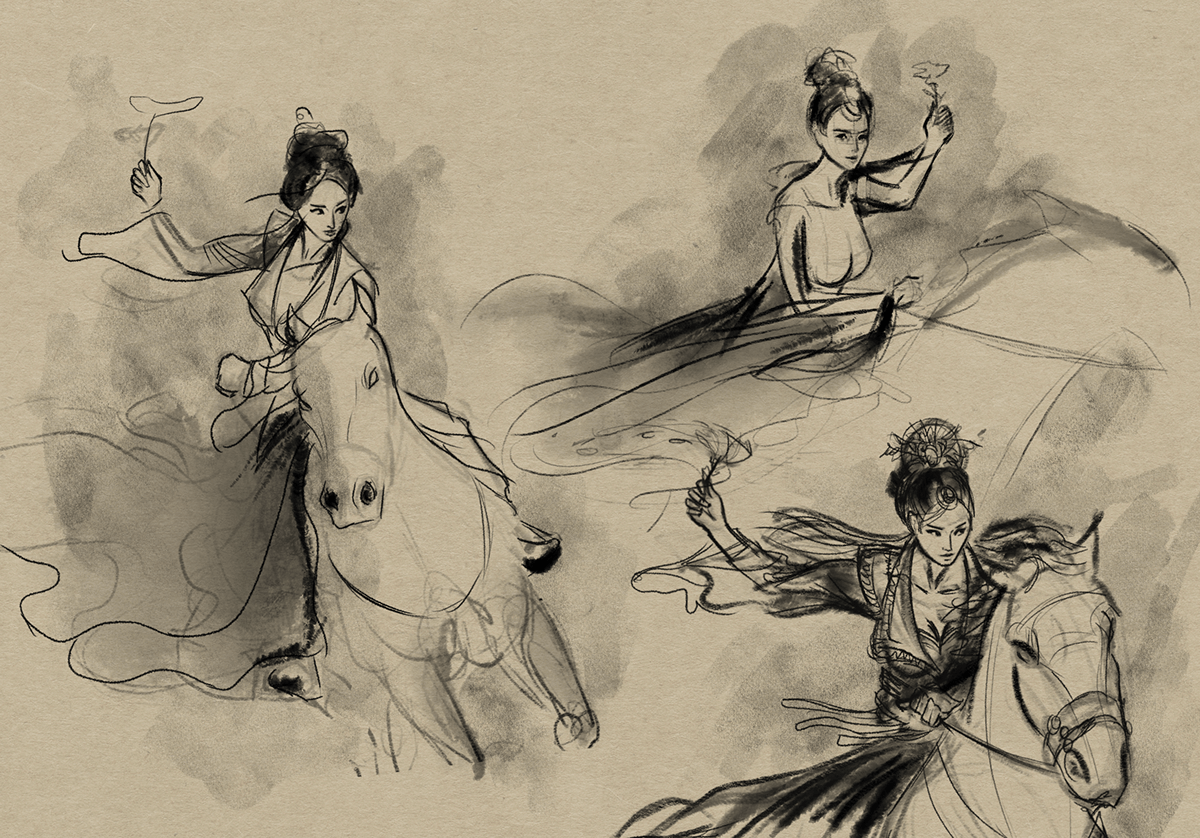This project is a journey into the over 4000-years-long history of China.
These are the notes I took while reading and researching this extremely vast and complex subject.
The notes are only about what struck me most: some important characters have been skipped, some less important or side ones have been included. I've drawn what I liked most, so this won't be a really accurate historical manual.
Enjoy :)
Yu The Great (c. 2123–2025 BC)
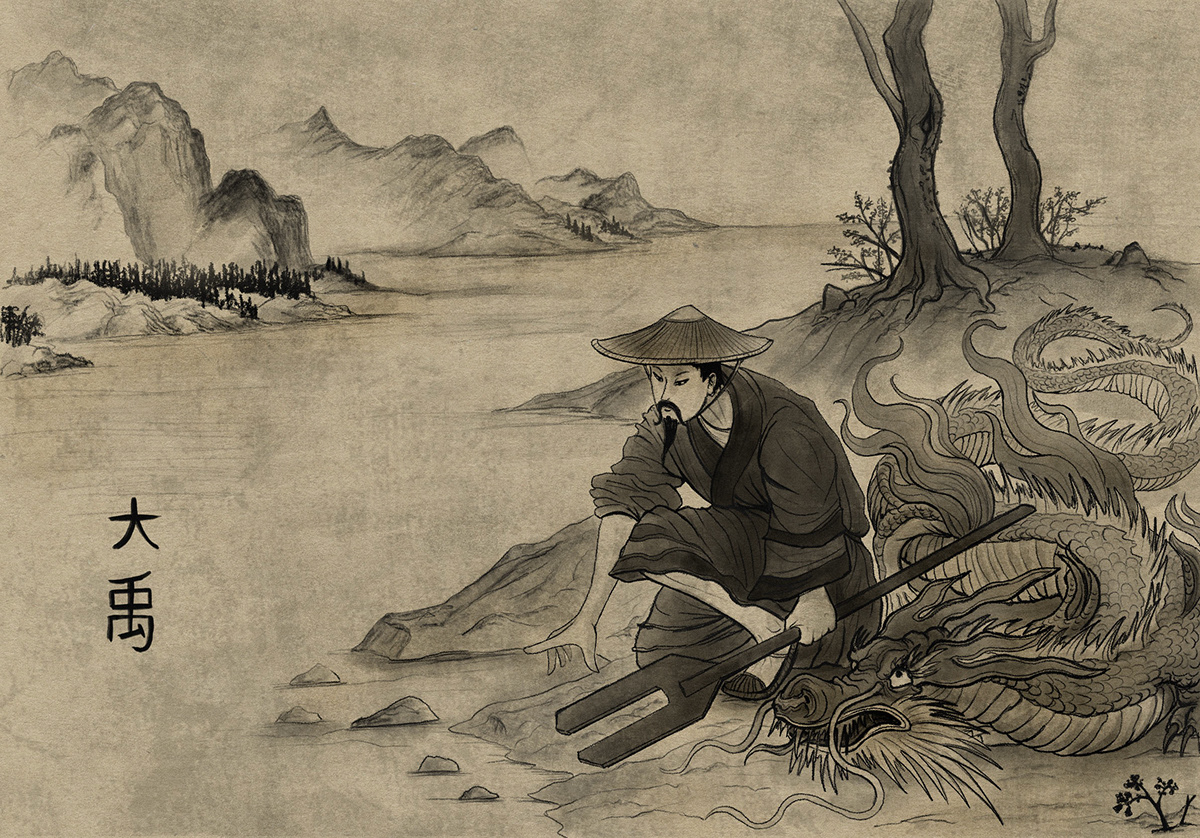
Every story begins with a legend.
This story begins at the end of the Five Emperors time, in the age of the great flooding.
Yu, following his father’s footsteps, is tasked with taming the great Yellow River.
Where his father failed, he succeeded.
He sleeps and works with the dredgers. During the thirteen years of flooding, he passed by his own family's doorstep so many times, but each time he did not return inside his own home.
Such was his dedication and hard work, such were the virtues of his merits, that Shun, the last of the Five Emperors, conceded his throne to Yu (posthumously named “The Great”)
Thus the first Chinese Dynasty begins.
Thus begins the rule of the Xia Dynasty
Tang of Shang (Around 1600 BC)
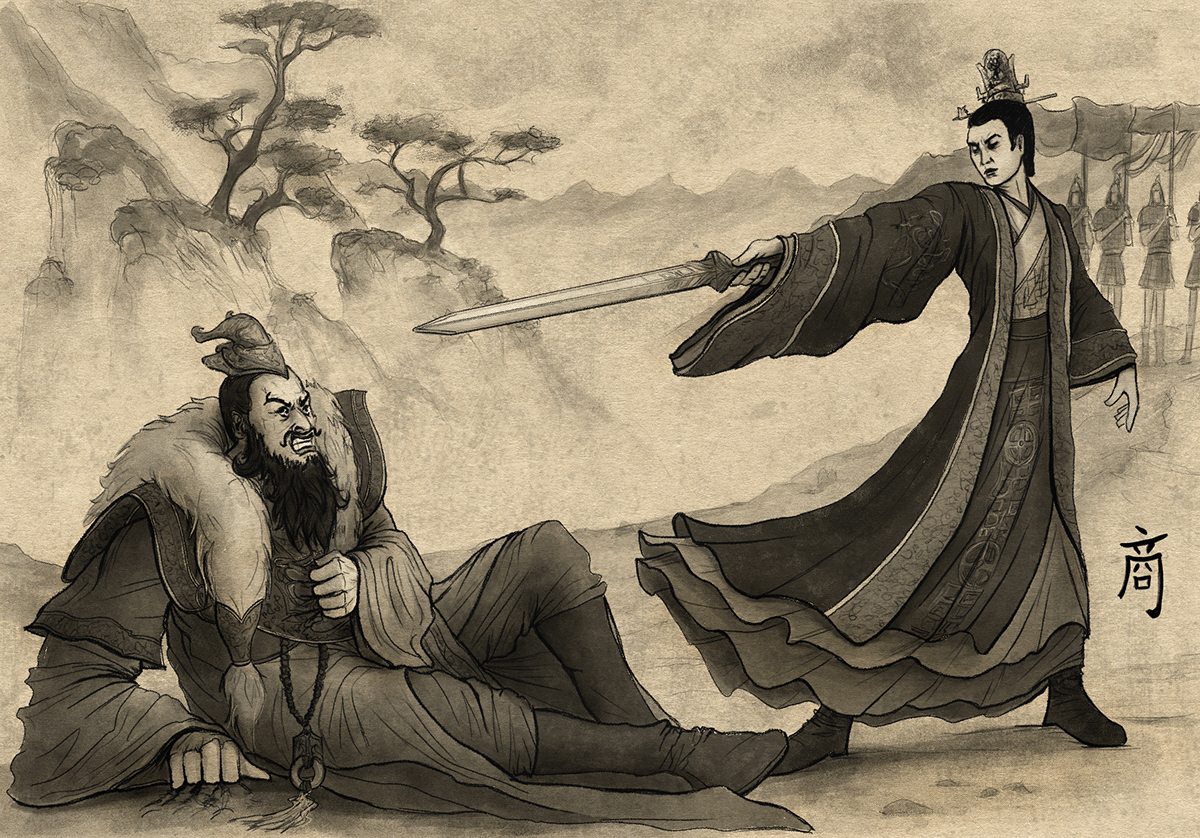
Tang of Shang rises above his enemy, the cruel King Jie of the Xia Dynasty
There will be a common pattern across most of the dynasties going forward. The founder of a dynasty will rise its name to the glory of heavens. By the end of its time, the spark of brightness will wither, its glory will be lost. A new, more worthy successor will rise and take the Mandate from the dying dynasty.
The Xia Dynasty rose to its glory with its legendary founder, Yu The Great.
Jie, its last king, was the sign that the time of Xia was over.
He is depicted as ruthless, cruel and with all kind of excessive vices.
Tang will rise against his tyranny and bring and end to the oppression
Jie, its last king, was the sign that the time of Xia was over.
He is depicted as ruthless, cruel and with all kind of excessive vices.
Tang will rise against his tyranny and bring and end to the oppression
This defeat is the end of the Xia Dynasty that lasted for about 500 years.
Now the new Shang Dynasty will take its place and receive the Heaven's Mandate.
Now the new Shang Dynasty will take its place and receive the Heaven's Mandate.
Qin Shi Huang (259 BC – 210 BC)
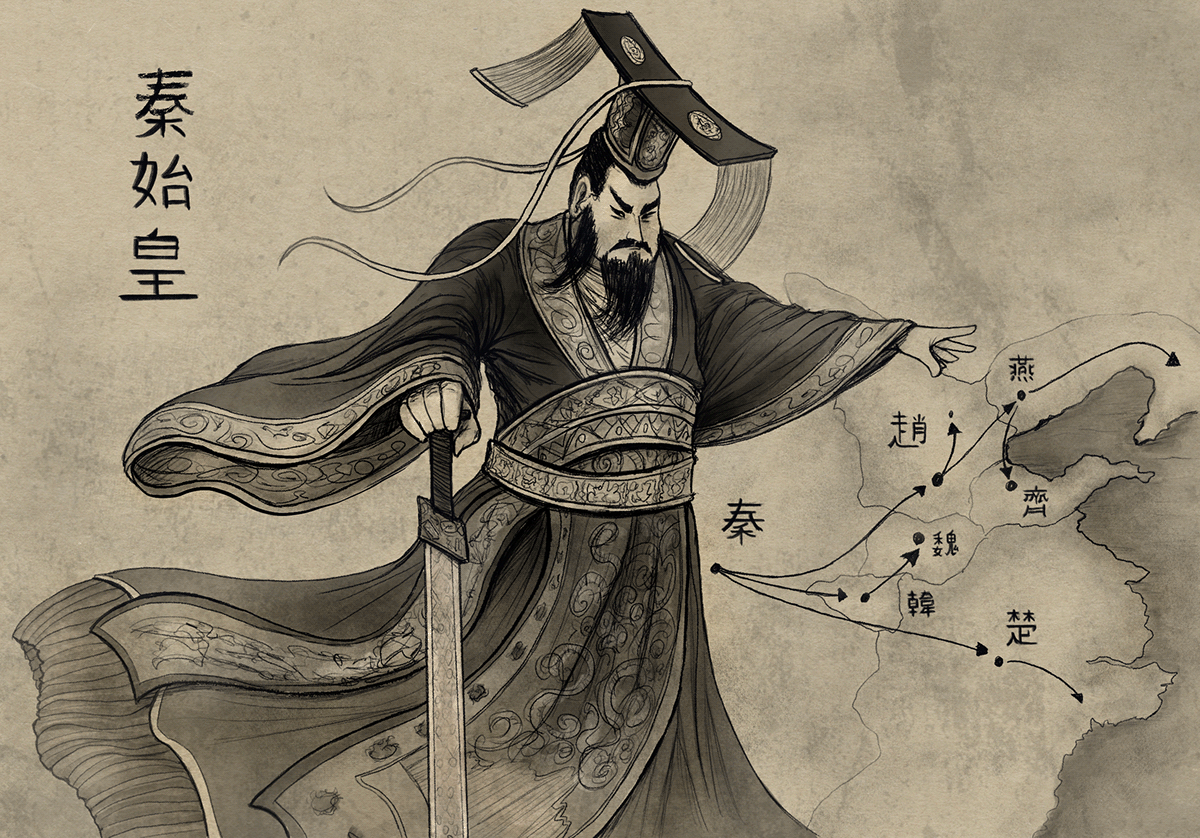
Qin Shi Huang will pass in history as The First Emperor.
After the end of the Zhou Dynasty, the land was split in many in-fighting kingdoms. The Qin will re-unite the kingdoms into one, single, first Empire.
After the end of the Zhou Dynasty, the land was split in many in-fighting kingdoms. The Qin will re-unite the kingdoms into one, single, first Empire.
He was known as King Zheng of Qi.
When he reunited the lands under one banner, he didn't follow the custom. He didn't name himself King.
Instead he created a new title of huángdì (Emperor) for himself.
When he reunited the lands under one banner, he didn't follow the custom. He didn't name himself King.
Instead he created a new title of huángdì (Emperor) for himself.
This new title combined two titles - huáng- of the mythical Three Sovereigns (三皇, Sān Huáng) and the dì of the legendary Five Emperors (五帝, Wŭ Dì) of Chinese prehistory.
King Zheng chose the new regnal name of "First Emperor" (Shǐ Huángdì), thus passing in history as Qin Shi Huang, The First Emperor.
King Zheng chose the new regnal name of "First Emperor" (Shǐ Huángdì), thus passing in history as Qin Shi Huang, The First Emperor.
Every emperor after him will be named huángdì.
(P.S. this will be important later!)
(P.S. this will be important later!)
Unfortunately his dynasty will be short lived (from 221 to 206 BC). When the first emperor died his two advisors placed an heir on the throne in an attempt to retain control. These advisors squabbled among themselves, resulting in both of their deaths and that of the second Qin Emperor.
The dynasty will later fall to Liu Bang of Han
The dynasty will later fall to Liu Bang of Han
Xiang Yu and Liu Bang (c. 200 BC)
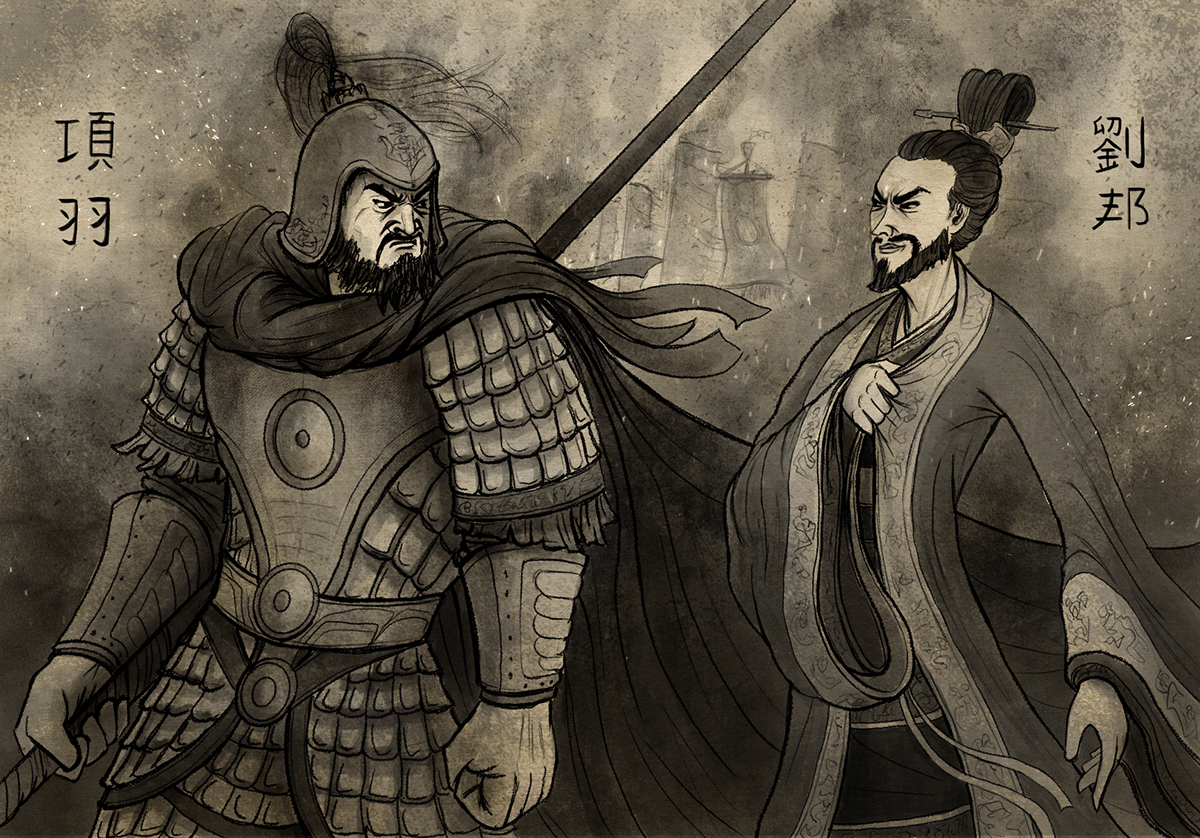
At the time, Qin Shi Huang was on an inspection tour in the region of Wu.
Xiang Yu and his uncle watched the emperor's procession pass by. Xiang Yu then said, "I can replace him."
Xiang Yu was slightly taller than eight chi (approximately 1.85 metres, about 6' 1"), possessed unusual physical strength and had a double pupil in one of his eyes (a mark of a king or sage in Chinese tradition)
After moving to Pei County, Lü Wen, a wealthy and influential gentry, held a feast for the local elite. It was declared that a seat inside the hall required gifts worth at least a thousand coins. Liu Bang, of humble origins and with no noble background, not only managed to attend the feast (without having a single coin), but he impressed the host Lü Wen so much that he was offered his daughter, Lü Zhi, as a wife.
Both of them raced to overthrow the Qin dynasty. Their rivalry will become legendary.
Even today in modern Chinese chess the two sides of the board are not named with colors, but instead one of them is called "Chu" (Xiang Yu's Kingdom) and the other "Han"
(Liu Bang's Kingdom). The middle that separates them is called " Chu river and Han border".
Only one of them will become the next Emperor...
(Liu Bang's Kingdom). The middle that separates them is called " Chu river and Han border".
Only one of them will become the next Emperor...
Empress Lü Zhi, Han Dynasty (241–180 BC)
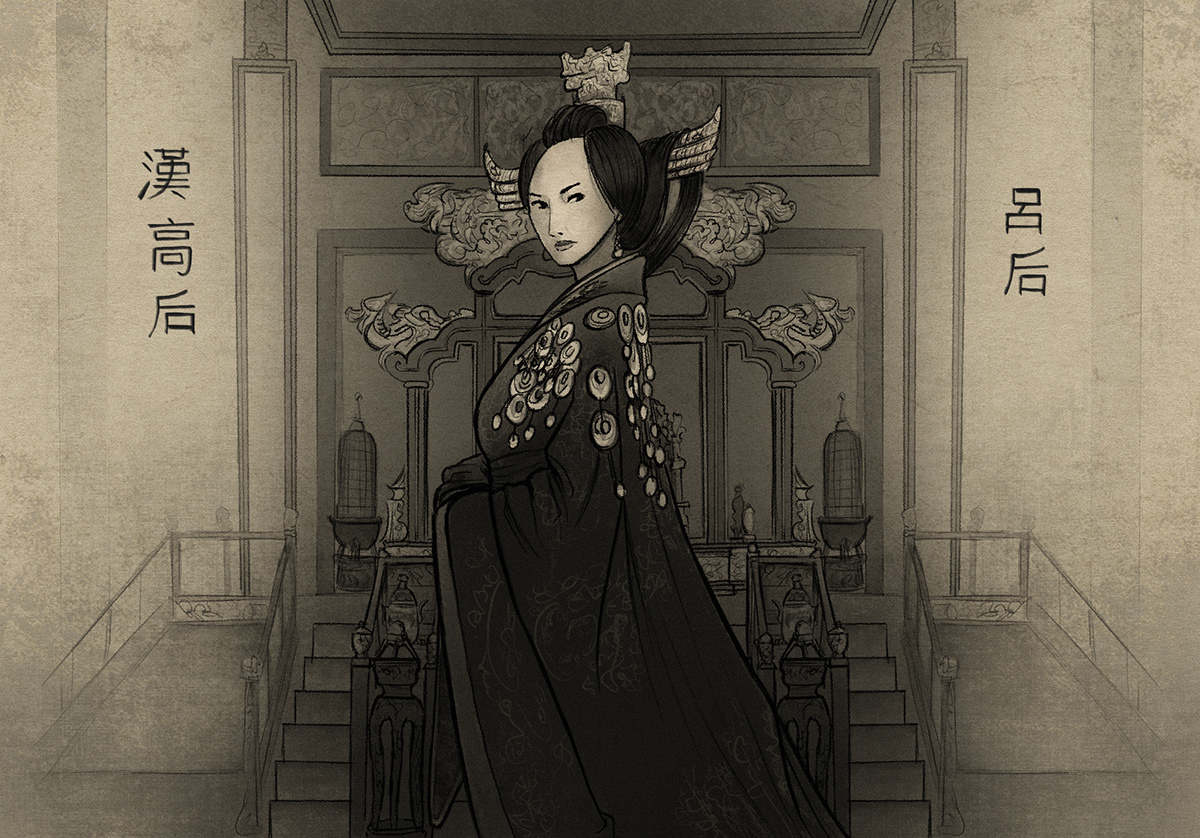
They say that when the ruling Emperor Hui (the successor of Liu Bang) saw what Lü Zhi did, he was so horrified that he was never able to rule again.
Even Liu Bang himself, now crowned as Emperor Gaozu, when he tried and failed to depose Empress Lü Zhi’s son as Crown Prince, said “I wanted to replace (the crown prince). Now I see that he has the support of those four men; he is fully fledged and difficult to unseat. Empress Lü is really in charge!”
She was married to Liu Bang since the humble beginnings of his ascension.
Now, after China has been unified again and the Han dynasty has been established, she was not intentioned to let this power go.
Her rule began while Liu Bang was still alive. Their son, appalled, will renounce any claim to imperial power.
She will rule the Han Dynasty uncontested for 15 years.
She will rule the Han Dynasty uncontested for 15 years.
Zhang Qian, the Explorer (c. 114 BC)
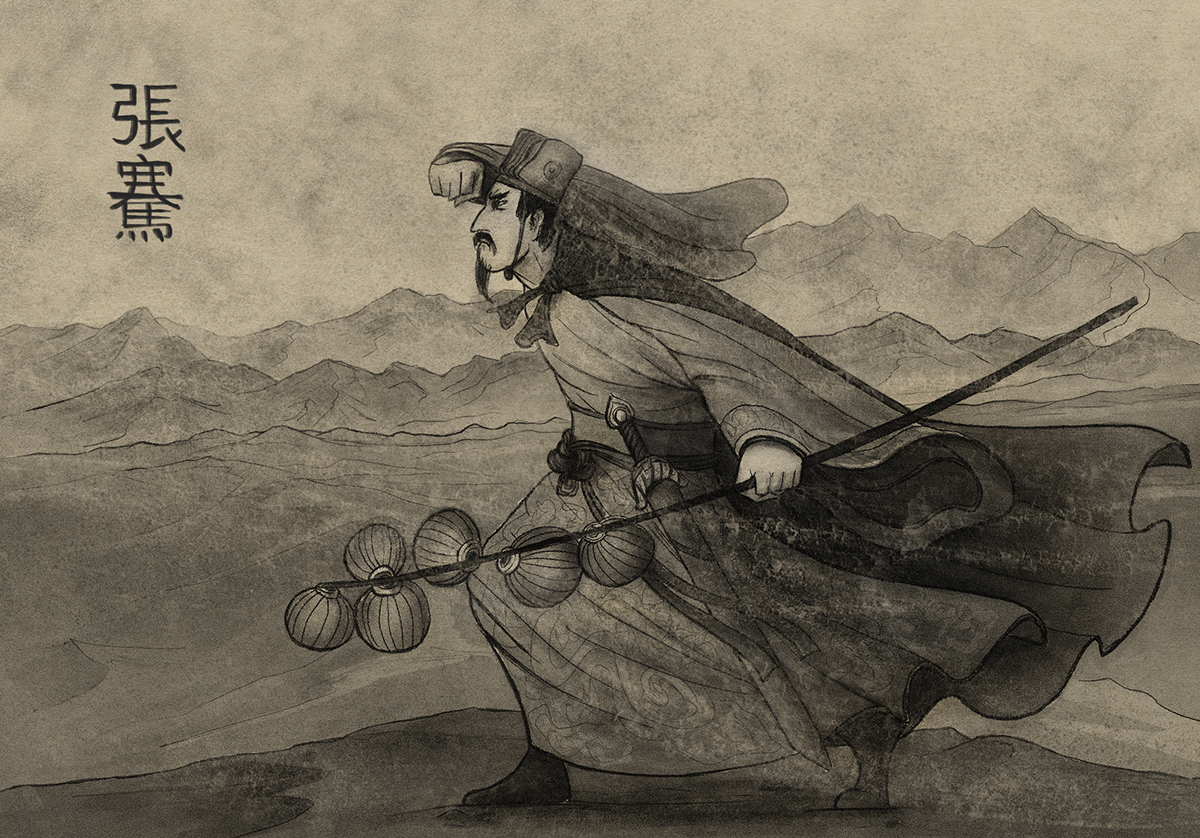
In 138 BC a group of 100 people is dispatched by the Emperor. Their task is to venture beyond the known lands, past the enemy territories and discover new lands and kingdoms for the Emperor of Han.
They are led by Zhang Qian, a military officer, and his local guide Ganfu.
Only Zhang and Ganfu will survive.
Only Zhang and Ganfu will survive.
They will be captured by the Xiongnu and held prisoners for 13 years.
Zhang will marry a Xiongnu wife and gain the trust of their leader. They will all eventually escape, venture even further before attempting their return to their homeland.
They will be captured again and will escape again to finally be able to reach Han's capital Chang'an.
Their journey will become legendary and the route they marked will eventually become known as the Silk Road.
Three Kingdoms (220-280 AD)
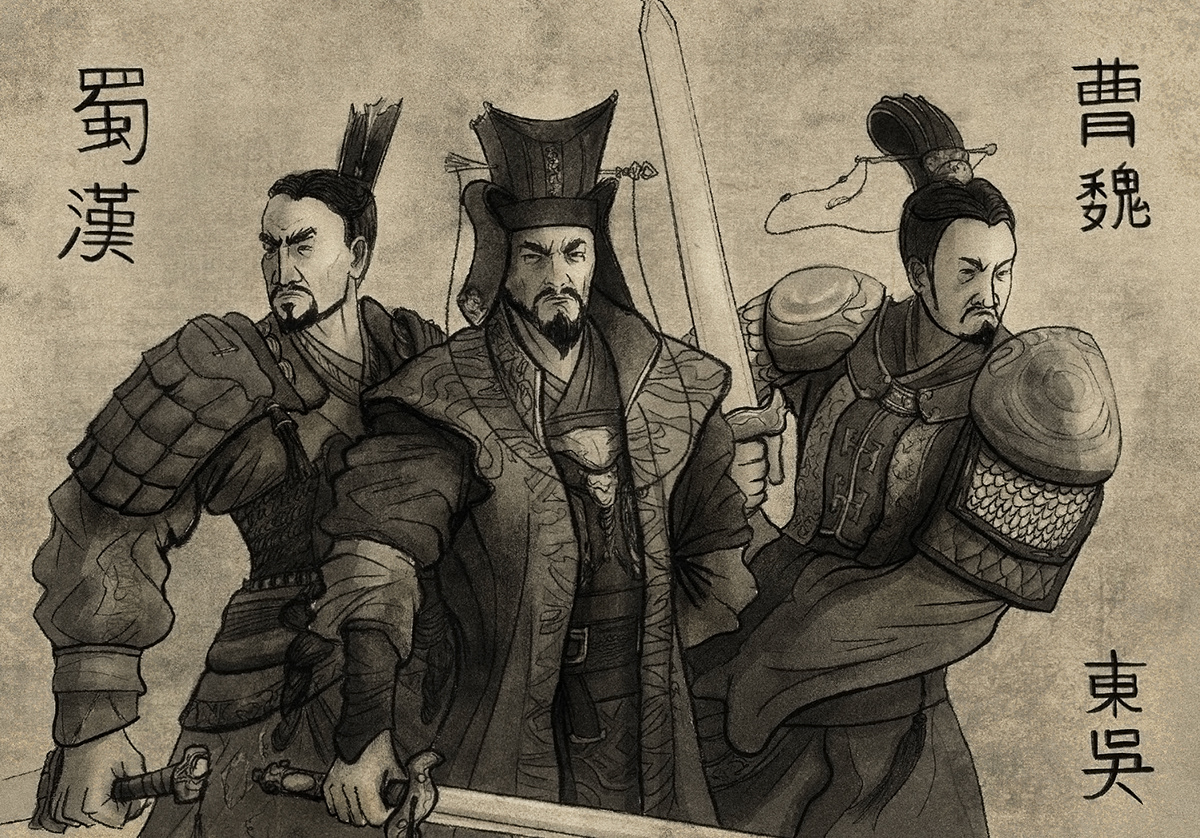
The Han dynasty's power is waning. Insurrections, treasons and civil war are soon to follow. Amidst the chaos a local warlord emerges. Cao Cao is rising fast and his armies grow by the day. Soon he comes close to reuniting the country and bring forth a new dynasty.
Yet the Battle at Red Cliffs proves him wrong. His two main enemies unite to prevent the south to fall into Cao Cao's hands.
None of them will ever be able to prevail.
Thus this period will be named The Three Kingdoms: Cao Wei in the north, Shu Han in the south and Eastern Wu.
Even historians will disagree and debate over which of those kingdoms actually held the Mandate of Heaven.
Yet the Battle at Red Cliffs proves him wrong. His two main enemies unite to prevent the south to fall into Cao Cao's hands.
None of them will ever be able to prevail.
Thus this period will be named The Three Kingdoms: Cao Wei in the north, Shu Han in the south and Eastern Wu.
Even historians will disagree and debate over which of those kingdoms actually held the Mandate of Heaven.
This period, however short, is one of the most bloody in Chinese history.
It is also one of the most popular in culture and literature: Romance of the Three Kingdoms (the Chinese answer to "War and Peace" from the West) is set in this time.
Sixteen Kingdoms of the Five Barbarians (304-439 AD)
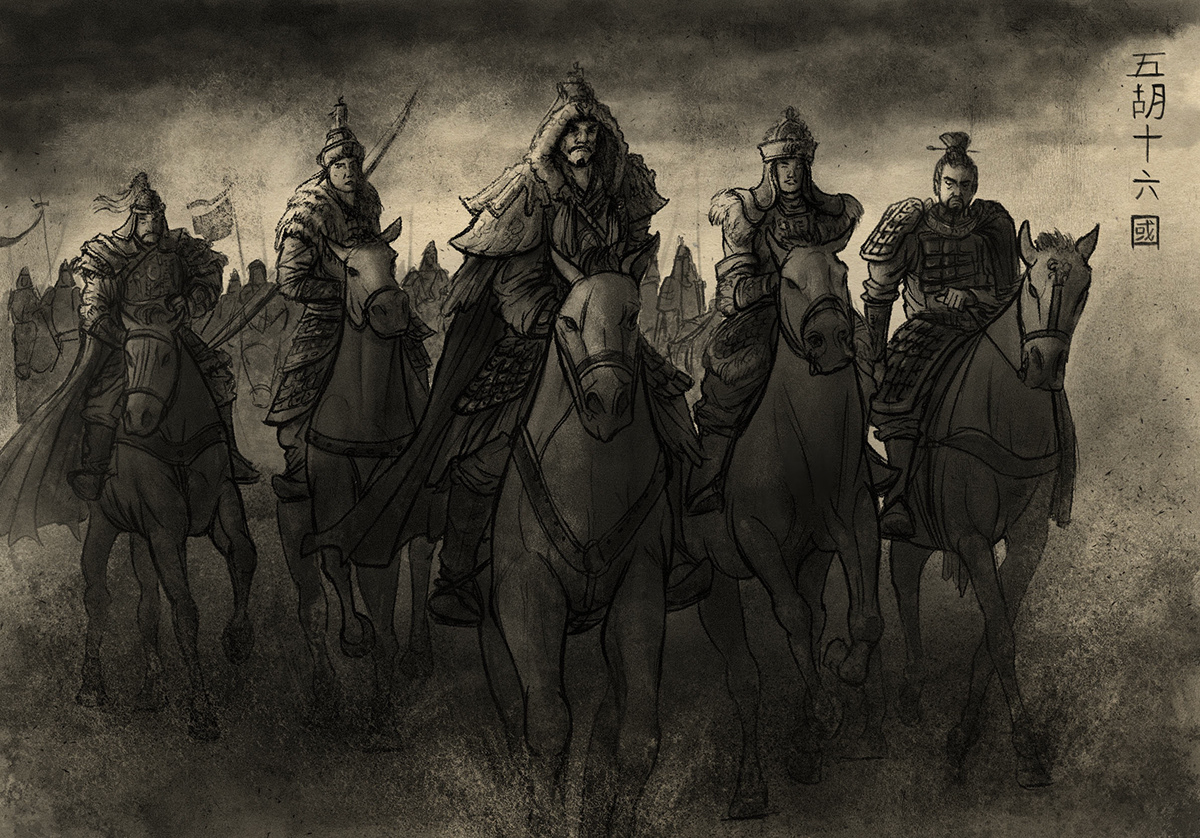
The bloody wars of the Three Kingdoms were just the beginning. The decline of the Han dynasty threw the land back into chaos. The three kingdoms were briefly united as the state of Wei, seized by the Jin Dynasty, managed to reunite the country. But the success was short lived: "the Country, once united, must divide".
This story closely resembles the rise and fall of the Roman Empire in the West (approximately happened in the same period) . Tribes from the north moved into the lands. What was left of the Jin dynasty fled, amidst infighting and chaos. Kingdoms shattered.
Northern warlords settled in. Many took Chinese names and adopted Chinese culture. Many founded Chinese-styled dynasties. They were so influential, that most of the sixteen kingdoms were somehow related to them.
Thus the name of the period: The Sixteen Kingdoms of the Five Barbarians
Northern and Southern Dynasties (420-589 AD)
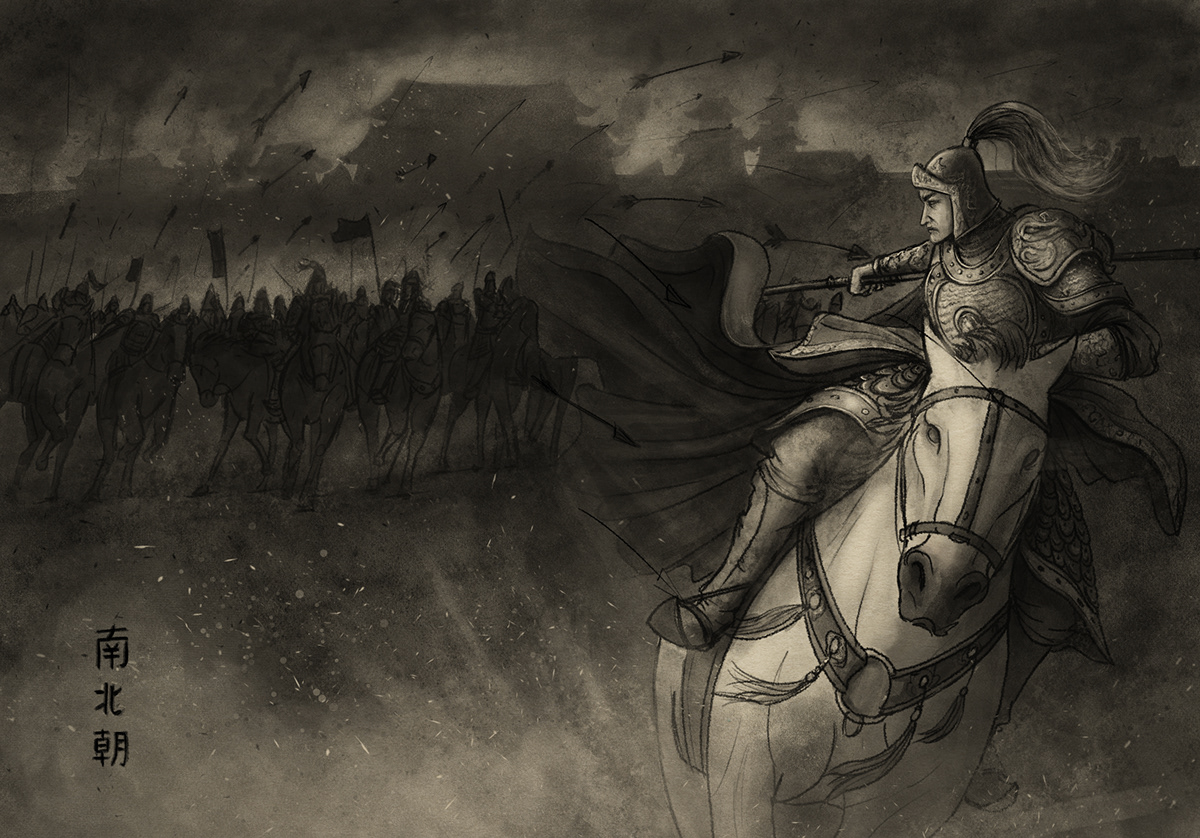
Luoyang is burning. The Jin court is in shambles and what’s left flees south. The North is lost.
So begins a long period of massive migration. Who’s left, who can, runs south.
Officially bearers of the Heaven’s Mandate, the Court finds shelter in the south.
But this brings neither peace nor stability. Jin are replaced by Song, Song are replaced by Qi, and so on.. The land owners and the local aristocracy will rule, while small dynasties will replace each other in endless cycles.
In the North eventually the Sixteen Kingdoms will be united under the Wei dynasty. But here the political turmoil will be different. Ruled by outsiders from the north, those who didn’t flee braced themselves into strong family clans to survive.
A strong militarization process will later define a clear boundary between the northern gentry and the the more refined southern aristocrats. This distinction will persist well into the Sui and Tang dynasties centuries later.
For a long time North and South will be split apart into the Northern and Southern Dynasties…
Tang Taizong (598-649 AD)

From his balcony in Chang’an Tang Taizong overlooks the might of the empire he has created.
The chaos is over. The Sui dynasty brought and end to the tumultuous period of the Northern and Southern dynasties, but it will be the Tang after them to rise the country to its glory.
This era, the "Reign of Zhenguan" is considered a golden age in ancient Chinese history and was treated as required studying material for future Crown Princes by the following dynasties.
While in the West Kingdoms are starting to fall deeper and deeper into the Dark Ages, the Tang Empire is about to take the place of the most powerful empire empire in the world.
Hardly any dynasty after Tang will reach this level of glory. For more than a century after Taizong's death, China enjoyed prosperity and peace brought about by the solidification of imperial protection over the Chinese regions.
Tang China's military might is uncontested, economy is flourishing and Chang’an is the city where merchants from the Middle East, travelers from Tibet and expeditions from India all meet in one astonishing, cosmopolitan capital.
Taizong himself will pass in history as one of the most brilliant Emperors in Chinese history, setting the bar so high that his successors will hardly be able to step out of his shadow.
Except for one…
Empress Wu Zetian (624-705 AD)
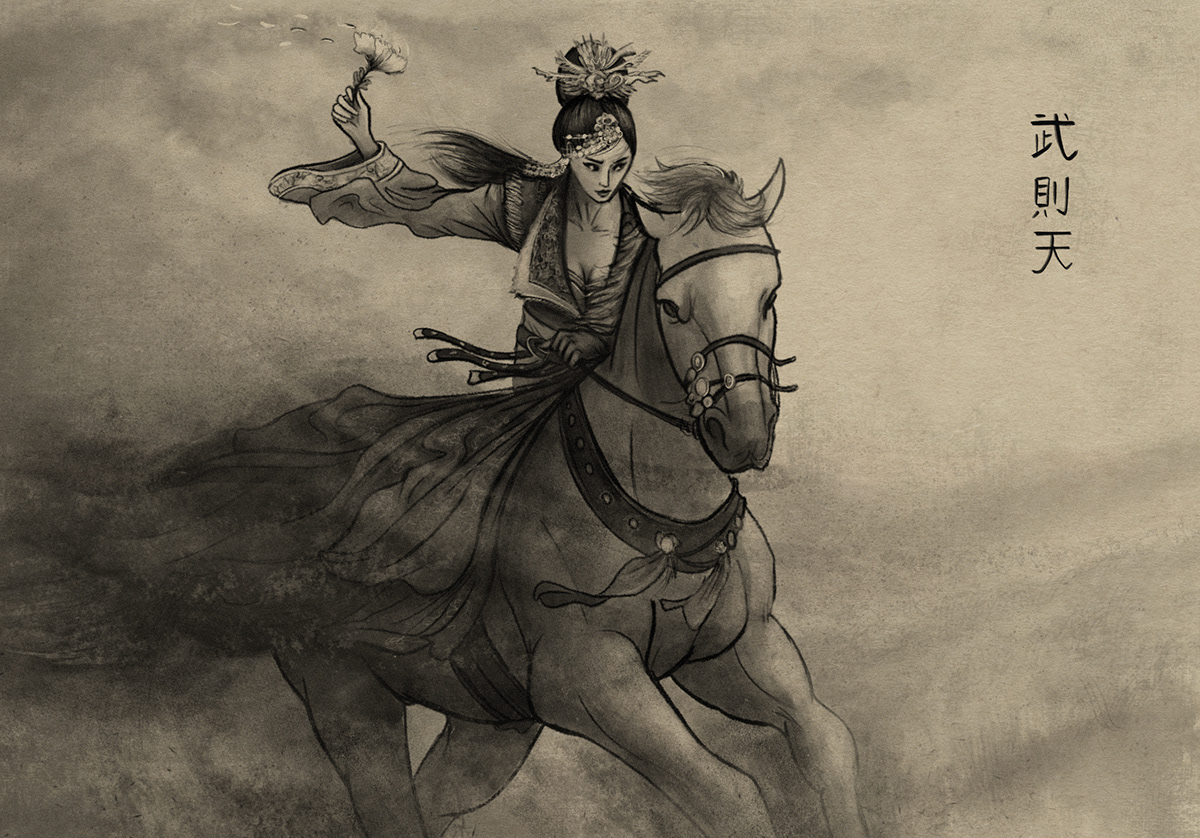
"China's only woman ruler, Empress Wu was a remarkably skilled and able politician, but her murderous and illicit methods of maintaining power gave her a bad reputation among male bureaucrats"
Wu Zetian is one of the most famous (and most controversial) figures in the whole history of China.
In a 4000 year long history of male-dominated society, she was the only woman to achieve the impossible: women could only aspire to the title of huanghou (皇后), often translated as "empress consort"; Wu Zetian was the only woman in the history of China to assume the title of huangdi (皇帝, translated as "emperor"), only reserved for male rulers. She declared herself Son of Heaven, ended the Tang dynasty and declared her own Wu Zhou dynasty.
In a 4000 year long history of male-dominated society, she was the only woman to achieve the impossible: women could only aspire to the title of huanghou (皇后), often translated as "empress consort"; Wu Zetian was the only woman in the history of China to assume the title of huangdi (皇帝, translated as "emperor"), only reserved for male rulers. She declared herself Son of Heaven, ended the Tang dynasty and declared her own Wu Zhou dynasty.
She started as a lowly Cairen in Tang Taizong's court. After his death, she married his successor Emperor Gaozong, officially becoming Gaozong's huanghou, although having considerable political power prior to this. She clashed with Empress Wang and Consort Xiao to gain the emperor's affection, and eventually expelled and killed them in a series of her skillful sedition. After that, Empress Wu's rise to power was swift. A strong, charismatic, cunning, vengeful, ambitious and well-educated woman who enjoyed the absolute interest of her husband, Empress Wu was the most powerful and influential woman at court during a period when the Tang Empire was at the peak of its glory. She was more decisive and proactive than her husband, and she is considered by historians to have been the real power behind the throne for more than eighteen years as she supervised the court on a daily basis.
After Gaozong's debilitating stroke in 660, Wu Zetian became administrator of the court, a position equal to the emperor's. Seven years later, she seized the throne in the Zhou dynasty, becoming the only empress regnant in Chinese history.
After Gaozong's debilitating stroke in 660, Wu Zetian became administrator of the court, a position equal to the emperor's. Seven years later, she seized the throne in the Zhou dynasty, becoming the only empress regnant in Chinese history.
Her reign is credited with a major expansion of the Chinese empire, extending it far beyond its previous territorial limits, deep into Central Asia, and engaging in a series of wars on the Korean Peninsula. In Chinese society she brought support for Taoism, Buddhism, education, and literature.
Yet the dynasties that followed made sure to associate her with all kind dark deeds, vilifying her for her actions in seizing imperial power and criticizing her harshly.
Yet the dynasties that followed made sure to associate her with all kind dark deeds, vilifying her for her actions in seizing imperial power and criticizing her harshly.
Thus her image is shrouded in tales, where facts are mixed with legends, dark myths, praises and honors...
Song Dynasty (960–1279 AD)
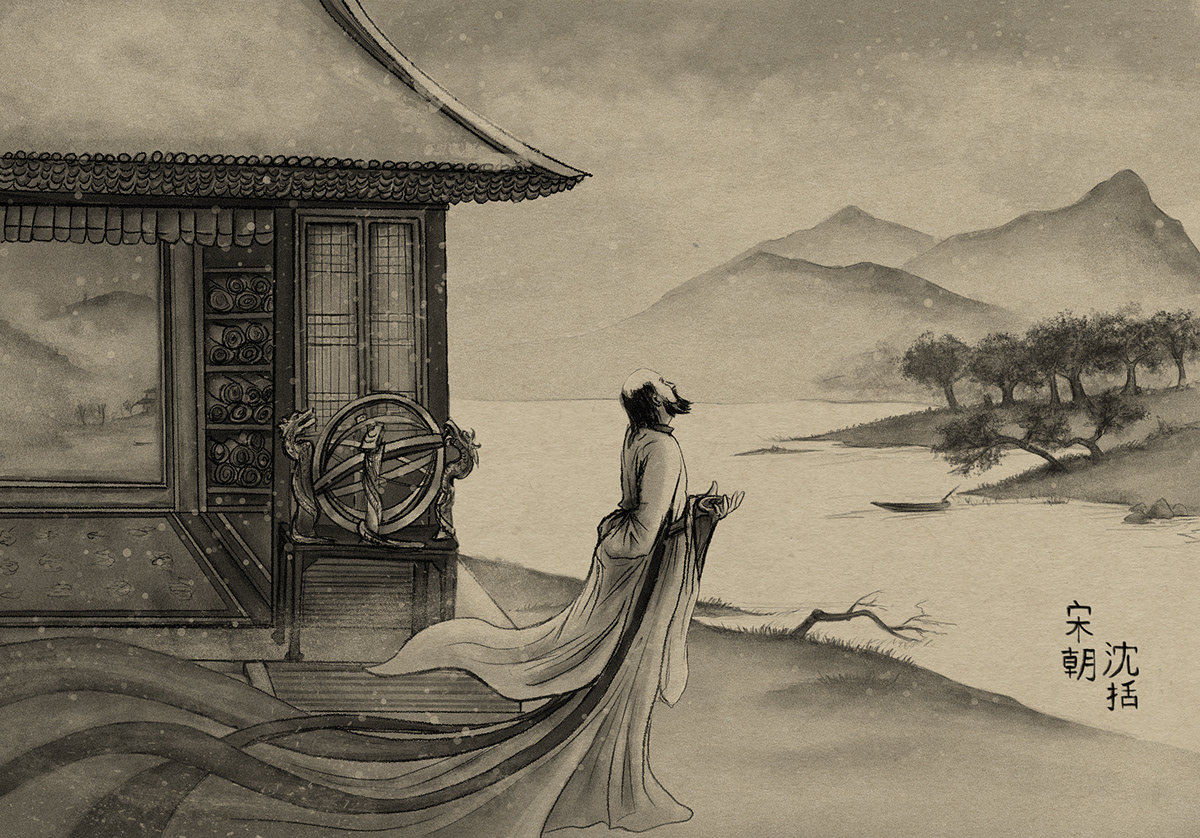
The Song Dynasty was an incredible era for culture and society.
The economy was booming. Kaifeng, already a capital in earlier dynasties, with its population of around one million was one of the greatest metropolises of the world under the Song.
Social life was vibrant: citizens gathered to view and trade precious artworks, the populace intermingled at public festivals and private clubs, and cities had lively entertainment quarters. It was the time of great and many works of poetry and literature being published.
The arts flourished, fueled by a rising demand from an ever-increasing wealthy middle class. Fine porcelain and theatre were all popular with the new urban elite.
The economy was booming. Kaifeng, already a capital in earlier dynasties, with its population of around one million was one of the greatest metropolises of the world under the Song.
Social life was vibrant: citizens gathered to view and trade precious artworks, the populace intermingled at public festivals and private clubs, and cities had lively entertainment quarters. It was the time of great and many works of poetry and literature being published.
The arts flourished, fueled by a rising demand from an ever-increasing wealthy middle class. Fine porcelain and theatre were all popular with the new urban elite.
Technology, science, philosophy, mathematics, and engineering all saw incredible development in the Song Era
In the picture: Shen Kuo has sometimes been described as the Leonardo da Vinci of China.
He was a scholar who wrote on a wide variety of topics including mathematics, music, astronomy, calendars, cartography, geology, optics and medicine. He supervised water control projects, military organization, and travelled widely in the provinces advising local administrators. His writings on the theory of supply and demand are quite remarkable. He wrote on methods of forecasting prices, the currency supply, price controls, market intervention and other topics which were not studied again in this depth until modern times.
Unlike Greek astronomers who tried to explain all motions as circular, Shen proposed that planets moved in a willow leaf motion composed with circular motion round the earth. He is also said to have constructed a armillary sphere, a water clock, and a bronze gnomon, a pointer whose shadow gives the time of mid-day.
He was a scholar who wrote on a wide variety of topics including mathematics, music, astronomy, calendars, cartography, geology, optics and medicine. He supervised water control projects, military organization, and travelled widely in the provinces advising local administrators. His writings on the theory of supply and demand are quite remarkable. He wrote on methods of forecasting prices, the currency supply, price controls, market intervention and other topics which were not studied again in this depth until modern times.
Unlike Greek astronomers who tried to explain all motions as circular, Shen proposed that planets moved in a willow leaf motion composed with circular motion round the earth. He is also said to have constructed a armillary sphere, a water clock, and a bronze gnomon, a pointer whose shadow gives the time of mid-day.
There's only one topic that was neglected by the Song : war....
Kublai Khan, Yuan Dynasty (1215-1294 AD)
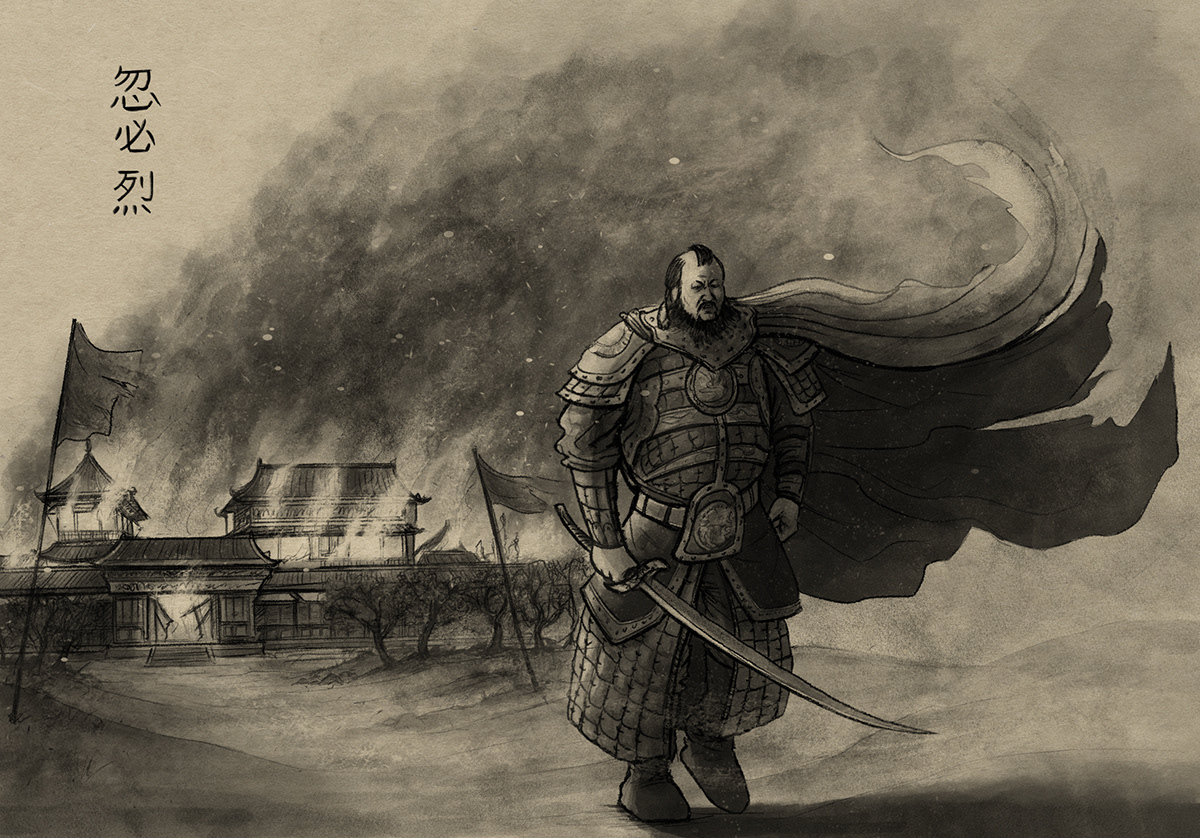
The beauty of the Song Dynasty in the end was its weakness and led to its downfall. Although they were able to resist the northern threat of the Jurcens, they were not prepared for the advance of the Mongols.
The rise of Genghis Khan will bring the Mongol cavalry up to the pyramids of Egypt. The Chinese empire will be one of the first to face this fearsome enemy.
With each assault, the Song were gradually pushed more and more into the southern regions.
Eventually Kublai Khan, descendant of the legendary Genghis, will resolve the internal struggles for power with his brother Ariq and march his forces deep into Song territory.
Little could this dynasty do. In 1275, a Song force of 130,000 troops under Chancellor Jia Sidao was defeated by Kublai's forces. The last remaining ruler, the 13-year-old emperor Emperor Huaizong of Song, committed suicide, along with Prime Minister Lu Xiufu.
Kublai had a great interest in Chinese culture despite his Mongolian origins. Being already a Khagan of the Mongol Empire, after the defeat of the Song, he will proclaim himself as a Chinese Emperor as well. He will start the Yuan dynasty and unify China under his new rule.
Kublai was also a prolific writer of Chinese poetry, though most of his works haven't survived.
His Mongol rule of Tibet, Manchuria, and the Mongolian steppe from a capital at modern Beijing were the precedents for the later Qing dynasty's Inner Asian Empire.
Hongwu Emperor, Ming Dynasty (1328-1398 AD)
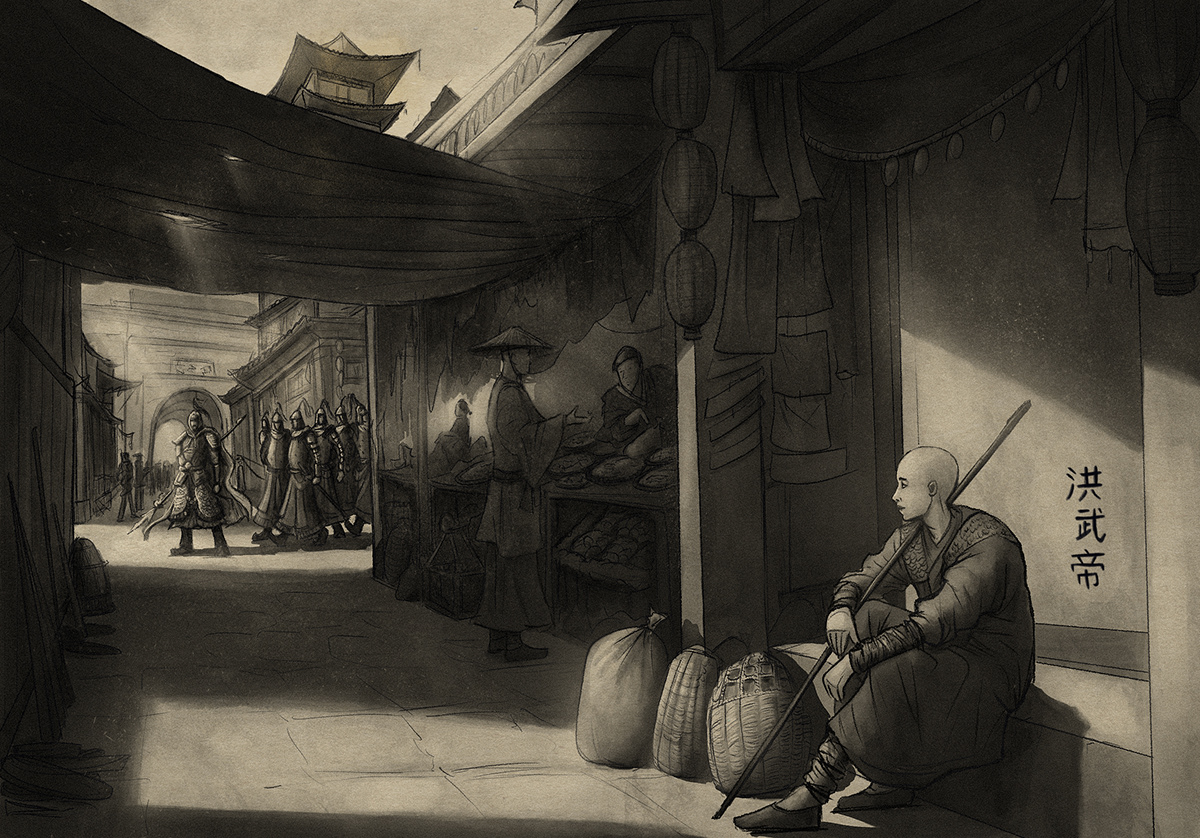
A beggar in the streets of yet another town, dressed in monk robes, watches martial warriors in gleaming armor passing by. The Buddhist monastery is not doing very well, so he is obliged to sometimes beg in the street for his daily bread.
Those Royal, elite guards, they are the symbol of prestige and power. The young man watches them from afar, like a distant vision...
This fictional scene is a portrait of the destiny Zhu Yuanzhang, who is known in history by the name of Hongwu Emperor.
This fictional scene is a portrait of the destiny Zhu Yuanzhang, who is known in history by the name of Hongwu Emperor.
Like Liu Bang of Han before him, Zhu Yuanzhang's story is a classic rags-to-riches fairytale. Born to a family of impoverished peasant tenant farmers in Zhongli Village, he roamed around central China for several years. He then joins a Buddhist monastery, which will provide him food and shelter and where he learns to read and write.
The Mongolian Yuan dynasty had ruled China since the Mongol invasions of the third quarter of the 13th century, but it was steadily losing its grip on control. Famines, plagues, floods, widespread banditry, and peasant uprisings are the norm.
Zhu, now 24 and not having many other options, decides to join the Red Turbans and their rebellion against the Yuan Dynasty. He quickly rises in their ranks and soon he's one of the leaders in control.
While the Mongols where struggling with control, one of his first steps of ascension is capturing the city Nanjing, the Yuan dynasty capital. And while the Red Turbans where trying to bring back the previous Song Dynasty, he proceeds in dismissing his two main rivals Chen Youliang, who had declared himself Han emperor in 1360 and the salt smuggler and pirate Zhang Shicheng in 1363.
Zhu is thus left as the most powerful leader in China, and, after chasing the remnants of the Mongol army back to Mongolia, he declares himself emperor.
His Dynasty will be Ming (meaning 'bright' or 'light') and his name will become Hongwu (meaning 'abundantly martial').
Zheng He, Ming Dynasty (1433 - 1435 AD)
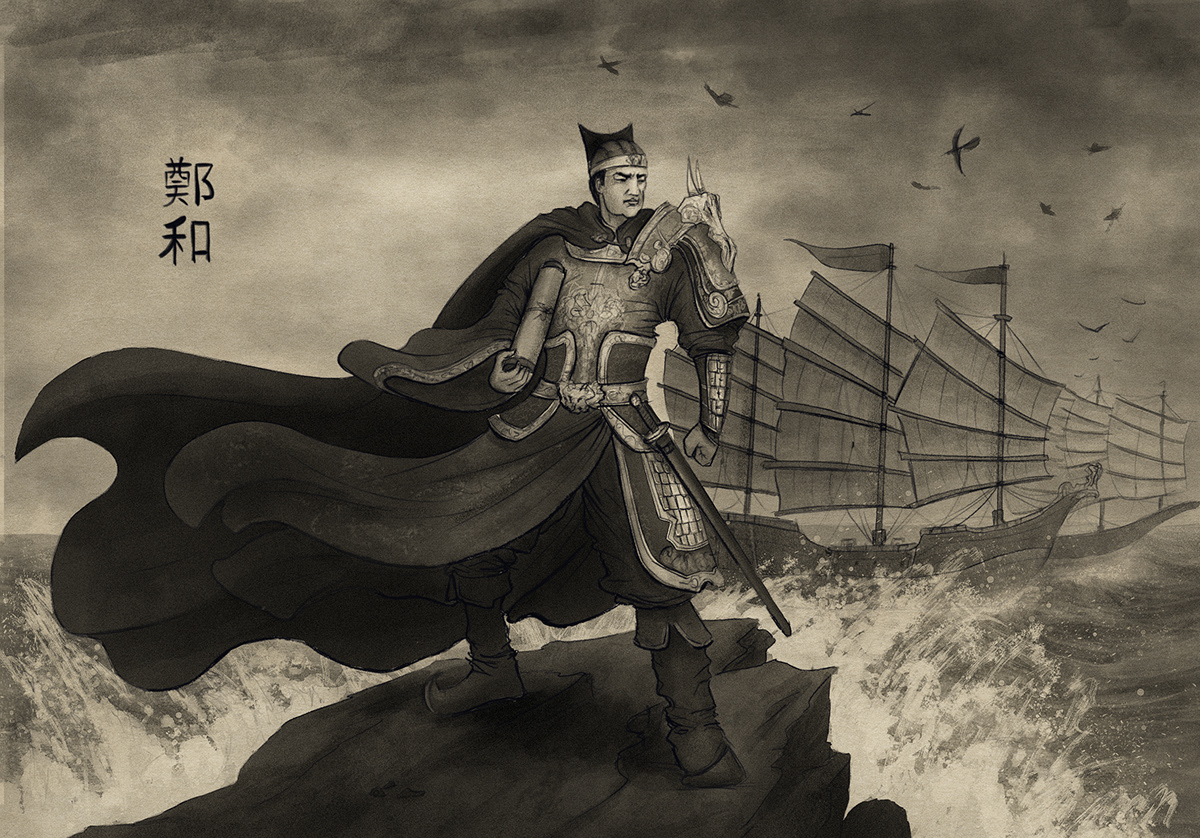
Aided by eunuch spies and turncoat generals, the future Yongle Emperor manages to overthrow the current Jianwen Emperor and crown himself instead. Yet some rumors spread that the Jianwen Emperor managed to escape from the burning palaces of Nanjing by disguising himself as a Buddhist monk.
Zheng He was born to a noble family. They were Muslim, so when he was born he was originally named “Ma He.” Ma is the Chinese version of Mohammed, the great prophet of the Islamic faith. When his home in Yunnan was attacked and conquered by soldiers from the Ming army, Ma He, like many children, was taken captive and brought to serve as a eunuch in the Ming Court. While serving in the royal court, the Emperor had noticed that Ma He was a hardworking boy. Ma He received military training, and soon became a trusted assistant and adviser to the emperor. Thus the Emperor gave Ma He the new title of Grand Eunuch and the new name “Zheng” He.
Despite the official neglect, the adventures of the fleet and the voyages of Zheng He captured the imagination world historians today. They show that Chinese ships could have ruled the Indian Ocean for many more years and possibly been able to sail to the Americas.
Yet, after the final voyage, the Chinese emperor suddenly ordered that these expensive expeditions be halted. The ships were left to rot in the harbors, and craftsmen forgot how to build such large ships, letting the knowledge slip away.
Some records say Zheng He was sent not to explore distant lands, but to search for the escaped Jianwen Emperor.
Some say the Jianwen Emperor stopped haunting his successor and the voyages were no longer necessary...
The true reason might remain unknown for ever, but one thing is known: the borders of Ming China will close. There will be no fleet and no exploration. It will be the West to come to China, centuries later..
Zhengtong Emperor, Ming Dynasty (1427-1464 AD)
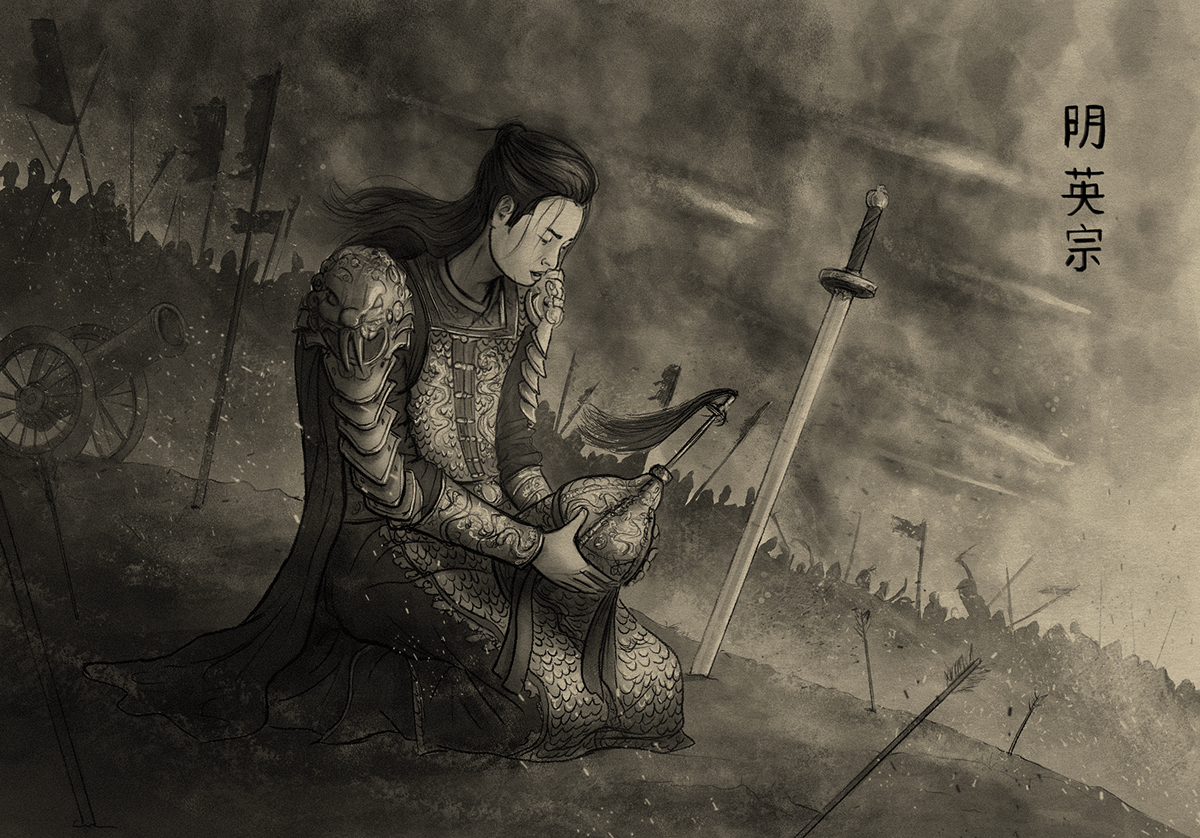
As a kid he liked playing with toy soldiers. At the age of 22 he got a real army.
The story of the Zhengtong Emperor has little significance in the whole spectrum of the Ming Dynasty, but in its way it highlights the problems this dynasty had.
The story of the Zhengtong Emperor has little significance in the whole spectrum of the Ming Dynasty, but in its way it highlights the problems this dynasty had.
The Oirat troops were raiding the Western borders. Incited by his eunuchs
(servants of the royal court) and opposed by his military commanders, the Zhengtong Emperor decides to go to war.
This battle will be remembered as one of the greatest military disasters in all of China's history.
500.000 Ming troops were resoundingly defeated by 20.000 Oirat cavalrymen.
(servants of the royal court) and opposed by his military commanders, the Zhengtong Emperor decides to go to war.
This battle will be remembered as one of the greatest military disasters in all of China's history.
500.000 Ming troops were resoundingly defeated by 20.000 Oirat cavalrymen.
When the Emperor realized what he had done, he just sat there, in the middle of the battlefield, awaiting his fate.
The Oirat that captured him didn't even realize at first who their prisoner was. Even when they did recognize the Son of Heaven they didn't know what to do with him: the Ming Court was fast and efficient in replacing Their Emperor.
They were so at loss with him that they decided to give him up. Thus, some time later, the Chinese court just receives a tribute and, along with it, a second Son of Heaven.
And now it was the Ming Court to be at loss: you simply cannot have two Sons of Heaven in the same palace....
Zheng Chenggong, "Koxinga" (1624-1662)
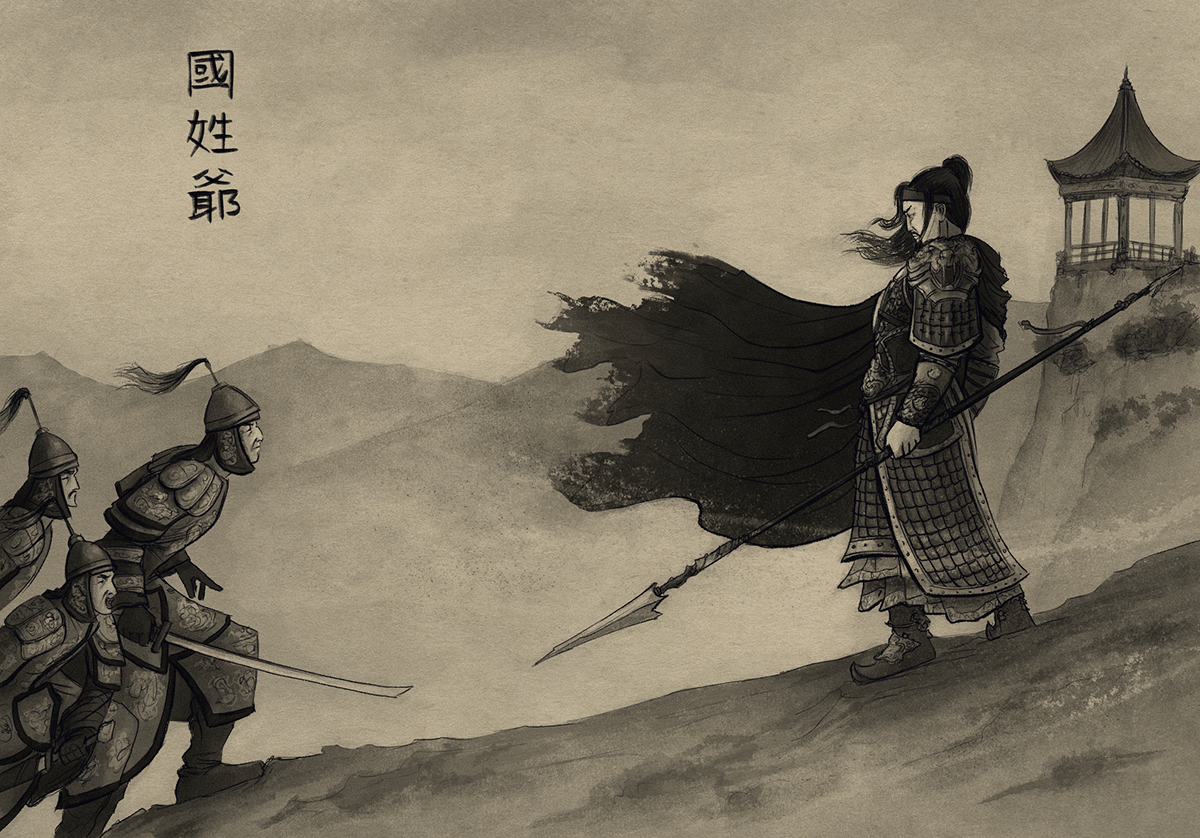
The Qing army is advancing. The Ming dynasty is at its end. Beijing falls in 1644 to rebels led by Li Zicheng and the last Chongzhen emperor, sixteenth emperor of the Ming dynasty, hangs himself on a tree on Prospect Hill in modern-day Jingshan Park in Beijing.
The Ming remnant forces retreat to Nanjing where they put Prince Fu on the throne as the Hongguang Emperor in an attempt to continue the Ming dynasty in the south.
The remaining descendants of the imperial family flee under the protection of the Zheng family. Yet, the betrayal of Zheng Chenggong's father will allow Qing forces to enter China uncontested.
The remaining descendants of the imperial family flee under the protection of the Zheng family. Yet, the betrayal of Zheng Chenggong's father will allow Qing forces to enter China uncontested.
Zheng Chenggong will take the place of his father and continue to oppose the advance of the Qing. He eventually will be forced to retreat to Taiwan, where he'll stay until his end in 1662
Zheng Chenggong will become a symbol of resistance and a relentless fighter. His legend is interesting because he was revered by several opposing political forces, but each one of them for their own, different reasons.
The enemy Qing came to admire him for his loyalty to the Ming even though it had been in opposition to their ancestors, and thus conferred honors on him.
He is renowned in Japan for his Japanese origins : his mother was Japanese and some say he looked like a samurai. Other notes say that Koxinga held samurai ideals on bravery, used "feigned and hearty laughter" to show anger, and adhered to bushido because of his samurai training and his Japanese upbringing.
Taiwan island is filled with temples in his honor for he will be one of the few Chinese to have ever been able to defeat a western power (the Dutch) and drive them away from the island. The name, "Koxinga" is how he was known by the Dutch, a romanization of "Guoxingye", a name he was given as an honor by the Emperor.
Qianlong Emperor, Qing Dynasty (1711 -1799)
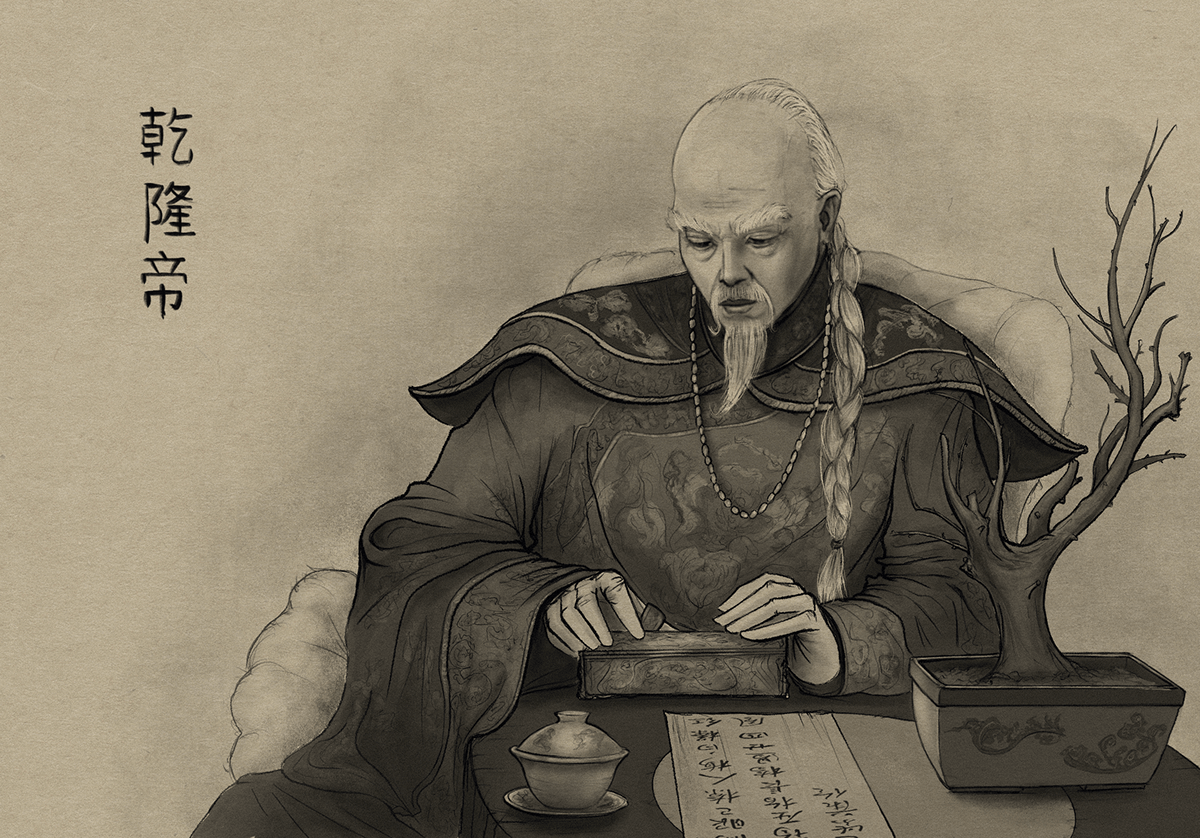
The Qing dynasty of Manchu origins will take over the Ming. They will establish a dynasty based on Manchu principles, honoring their origins and traditions and extending this influence to everyone under their rule.
The Qianlong emperor is often regarded as the most successful ruler of this dynasty. Qianlong saw himself as the emperor of not only the Han Chinese, the Manchus, and all the other ethnic groups in his empire, but also all beyond the empire. He will take upon himself the title of "Universal Monarch", deemed to rule "all under Heaven".
During his 61 years of reign he will achieve incredible military successes extending the Empire's supremacy. The Qing Empire will reach reached its most splendid and prosperous era under this Emperor.
Qianlong will also be a patron of the arts and quite a skilled poet and artist himself. He is known to be a hungry collector and even to this day the collections of the national palace museums in both Beijing and Taipei were largely formed under the Qianlong Emperor and are the largest repositories of important Chinese artifacts. On certain fixed occasions over a long period he contemplated a number of paintings or works of calligraphy which possessed special meaning for him, inscribing each regularly with mostly private notes on the circumstances of enjoying them, using them almost as a diary.
He is known to be one of the longest reigning rulers in the world. He will abdicate on his 61st reigning year in favor of his son, the Jiaqing Emperor.
It was said that the Qianlong Emperor had made a promise during the year of his ascension not to rule longer than his grandfather, the Kangxi Emperor, who had previously reigned for 61 years.
This will be the last period of glory for the Qing and the beginning of a slow, almost imperceptible, but, alas, inevitable decline.
Empress Nara, Qing Dynasty (1718-1776)
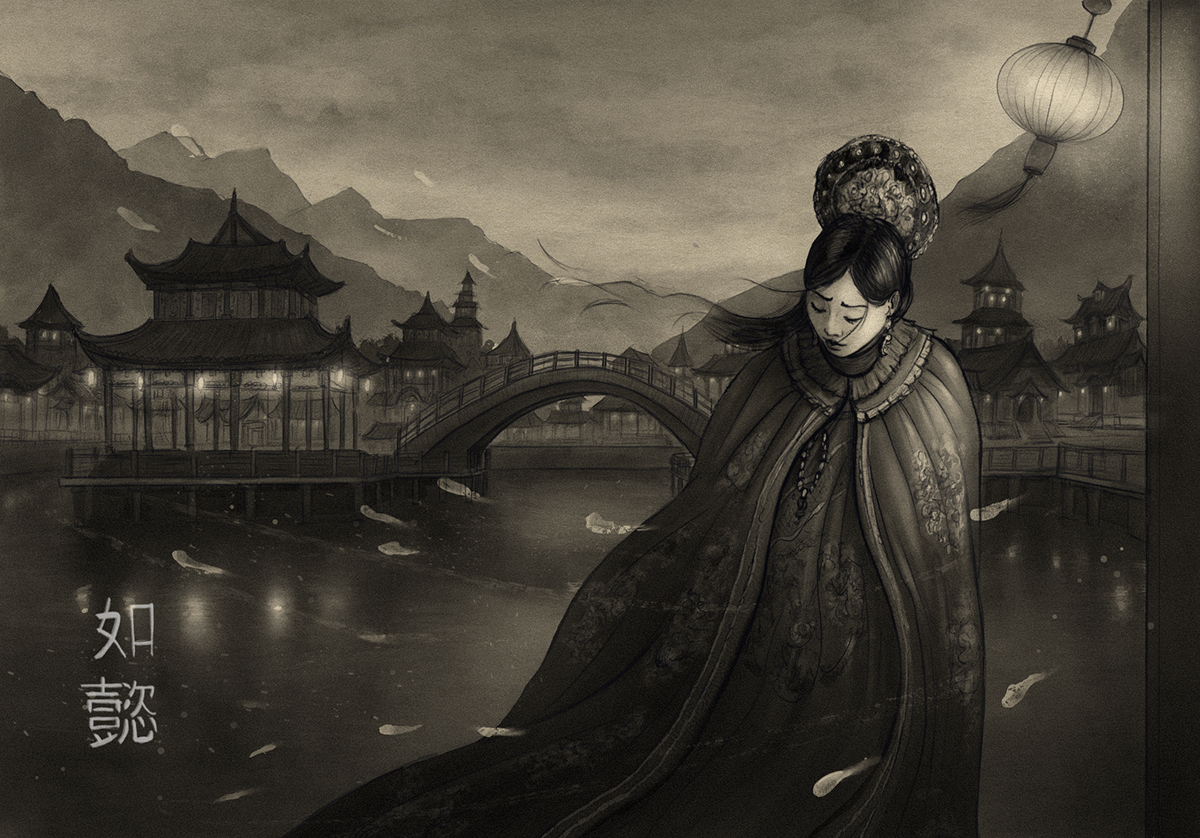
She was a capable and dutiful empress.
She was respected and accepted.
Yet one day for unknown reasons, the Ula-Nara Empress in a mad gesture cuts her hair in front of the Emperor. In the ritualistic Manchu dynasty of Qing this was a severe crime with extremely serious consequences.
But the punishment inflicted on her would be unprecedented: she will be completely erased. There are no records of her afterwards, all her rights as Empress were stripped.
No explanations, no words, no comments.
There’s little additional records or story facts to add about her. It’s suspected that was due to the Qianlong Emperor destroying all her records and portraits. I just like to remember her portrayed as Ruyi in the 2018 TV series : a fictional story about her life in the palace and a very compelling explanation of her ultimate, tragic, but at the same time beautiful downfall in The Forbidden City.
Zheng Yi Sao, the Pirate Queen (1775-1844)
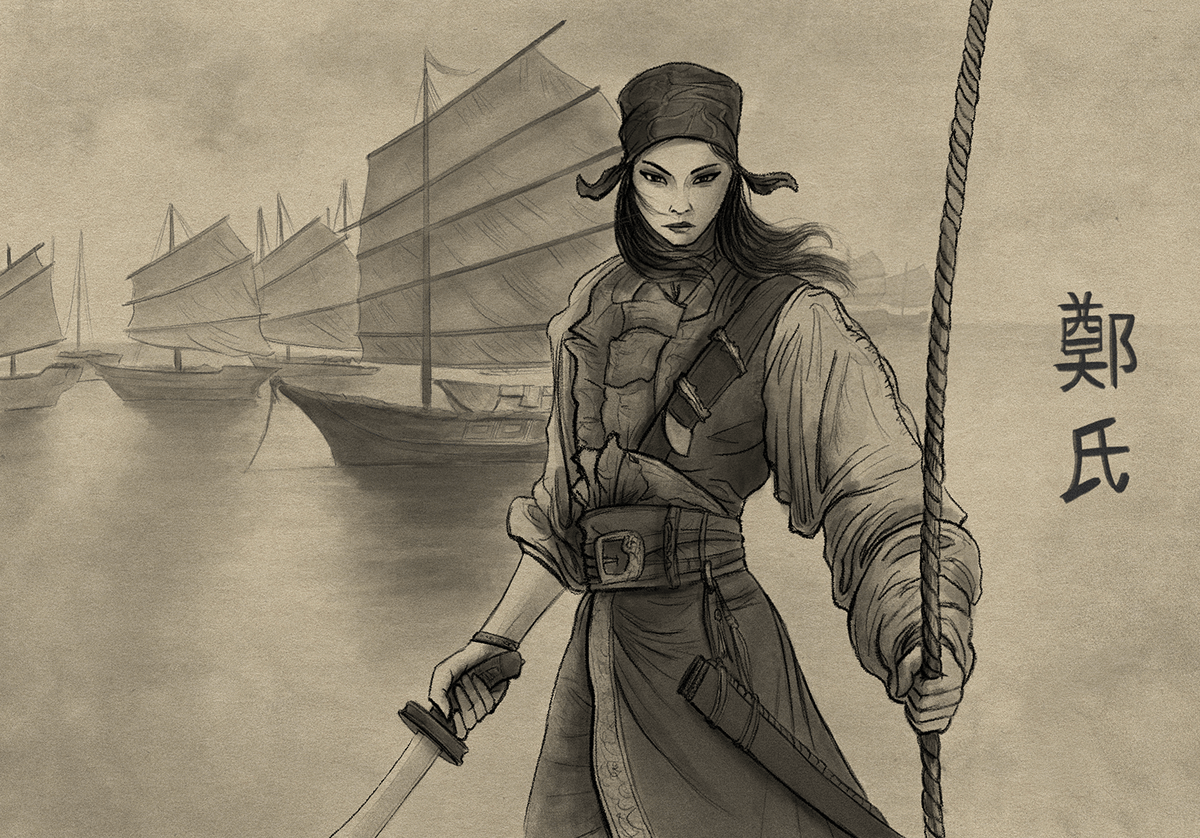
Shi Yang, better know as Zheng Yi Sao, has become famous as a Pirate Queen and is often regarded as the most successful pirate in history.
At her peak she commanded a vast fleet of around 1,500-1,800 ships crewed by 80,000 sailors.
She terrorized the Chinese seas for decades and she’s the only one who managed to inflict a naval defeat upon Western countries.
She started in a brothel in Canton. After marrying the pirate Zheng Yi, she became known as Zheng Yi Sao ("wife of Zheng Yi")
When he died, she took over his fleet, rallied through reputation and power other groups to join her cause and brought the pirate fleet to its glory.
By 1804, her alliance of pirate ships had become the most powerful pirate fleet in China, known as the "Red Flag Gang"
For years her Red Fleet not only withstood the assaults of the mainland power, but she also managed to fight back the European vessels as well.
After the betrayal of part of her fleet and a series of defeats, she realized the time has come to step down. Thus she successfully negotiated full amnesty and retention of part of her fleet
She died in her bed in Macau, at the age of 69
Fun fact 1: she is very popular in media and makes an appearance even in the movie Pirates of the Caribbean
Fun fact 2: she is little known in China, but very popular in the West. This is what you get for going against your government.
Empress Dowager Cixi, Qing Dynasty (1835-1908)
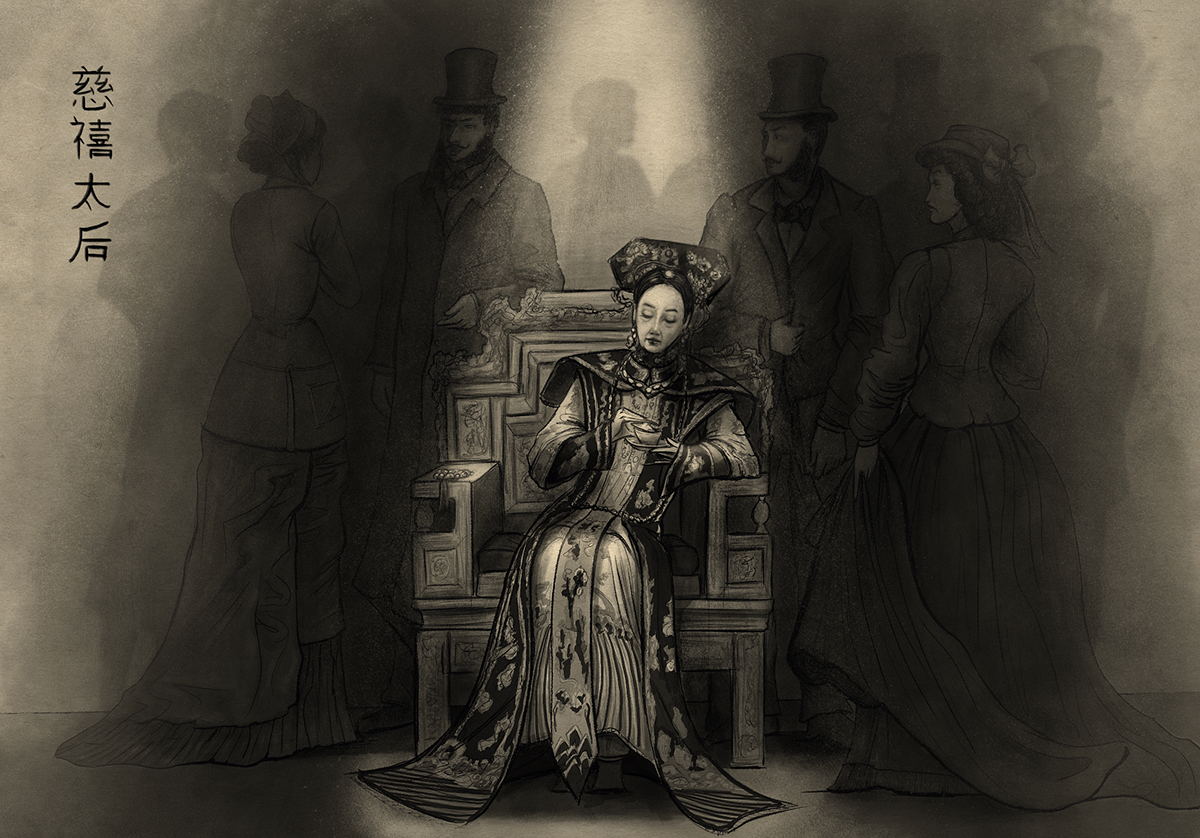
She found herself at the end of the Qing dynasty rule, confronted with issues dating back to the first emperors of the dynasty. It was too late to correct what's been done. The crisis and ultimate downfall of the dynasty was inevitable.
Her talents were highly regarded by many statesmen and officials who encountered or served her. She managed to steer the increasingly leaky ship of the Qing state through serious internal rebellions, foreign incursions and wars, trying to make the best of a weak position. With her skills and political prowess she managed to rule the country using the old ways in modernized time.
Her talents were highly regarded by many statesmen and officials who encountered or served her. She managed to steer the increasingly leaky ship of the Qing state through serious internal rebellions, foreign incursions and wars, trying to make the best of a weak position. With her skills and political prowess she managed to rule the country using the old ways in modernized time.
Formally, Cixi had no power, but she succeeded in mounting a coup against the regents with Empress Zhen, the late emperor's principal wife, before he was buried. Cixi falsely accused the regents of forging the emperor's will, ordered the suicide of the most important two and managed to crown the little Emperor Guangxu. Cixi promptly adopted him, though, bizarrely, she instructed him to address her as "my royal father". It was not a warm relationship.
She was reluctant to hand over the reins on the boy's maturity and retire.
She was reluctant to hand over the reins on the boy's maturity and retire.
She quickly came out of retirement to help with the trauma of a lost war against Japan in 1894, after which she retained an active role in state affairs, a position that left her well placed for her next coup.
In 1898 when Guangxu launched a radical reform programme against his "royal father", Cixi moved first: by September 1898, she had deposed and imprisoned Guangxu and taken the reins again herself.
The last few years of Cixi's career were no less dramatic: her biggest mistake was to encourage the disastrous Boxer rebellion which ended in a punitive foreign rescue and huge price to be paid by China and Cixi herself. She had to flee the capital, pausing only to order the killing of Guangxu's favorite concubine. When she returned to the capital she was chastened, and set about making friends with the ladies of the Legation quarter, the wives of the resident diplomats, in a belated effort to restore her reputation in the world.
She died in 1908, having poisoned Guangxu with arsenic the day before, making sure there was no way for him to make a comeback.
Her life and actions were very much debated afterwards.
Many portrayals of her depict a demonized and reactionary character, solely responsible for the misfortunes of the declining dynasty. A woman who murdered without a second thought to protect her own interests, who squandered the national treasury on her own pleasures and who set back reform in China to preserve herself.
Others mention her as an empress dowager who was an enlightened, even caring ruler who drove through a modernization programme. Had she lived just a little longer, China might have become a stable constitutional monarchy.
It will hard to know which one is true, but a woman who began her adulthood as a 16-year-old grade-three imperial concubine in 1852, and rose to hold supreme power in the Manchu empire for the best part of 40 years, was a remarkable ruler is not in doubt.
The Last Emperor (1906-1967)
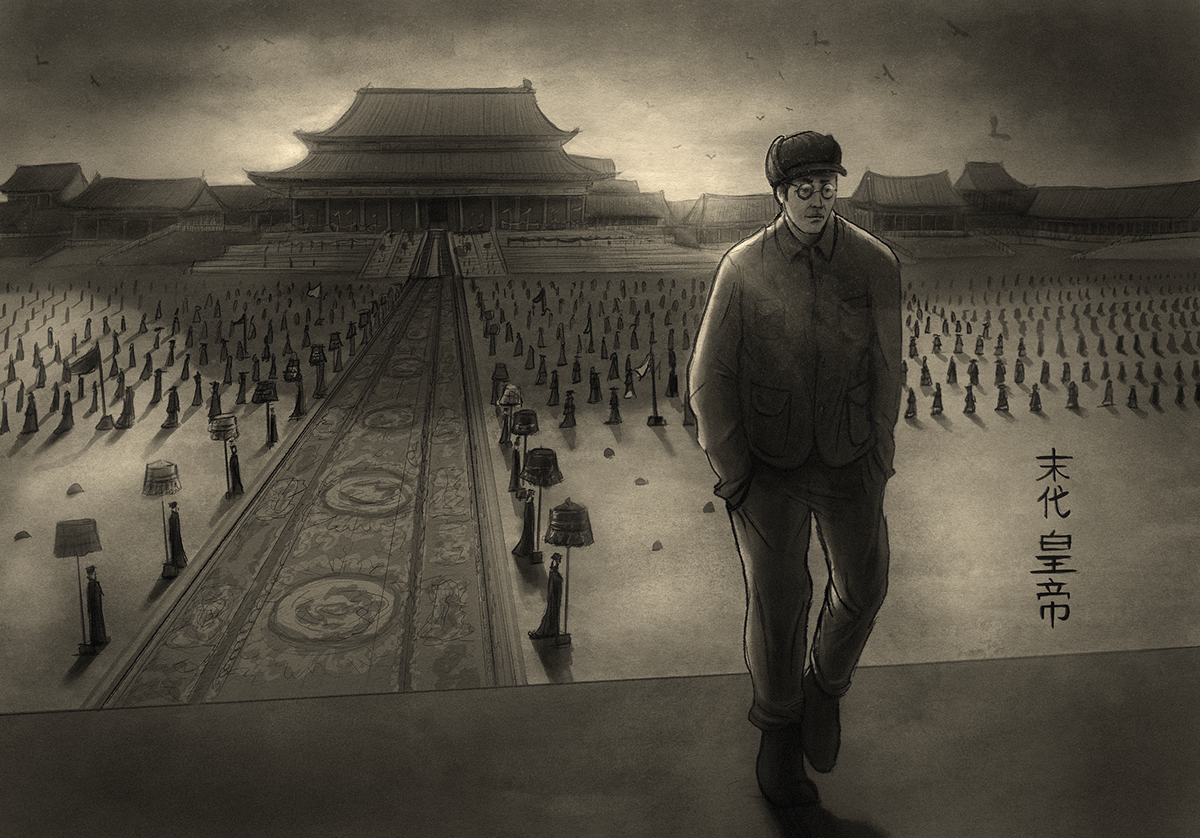
This is the end of the story.
There will be no more emperors after this one. The palaces will become museums and stages for stories and movies.
2,133 years of Chinese imperial history will be ended by a mother's note for a 6-year-old emperor, handing power over to Yuan Shikai's Republican army.
There will be no more emperors after this one. The palaces will become museums and stages for stories and movies.
2,133 years of Chinese imperial history will be ended by a mother's note for a 6-year-old emperor, handing power over to Yuan Shikai's Republican army.
During his lifetime, Puyi was crowned and deposed three times.
As his biographer Edward Behr remarked, his palace was the first of his many prisons.
As his biographer Edward Behr remarked, his palace was the first of his many prisons.
At the age of 2 years and 10 months, Puyi was summoned to the Forbidden City by the dying Empress Dowager Cixi. He was told to succeed Emperor Guangxu, since he had no heirs.
Puyi became the first emperor to speak and write English (in 1917 and 1934). He was also commonly known as Henry, a name chosen by his English language teacher, Scotsman Reginald Johnston.
Puyi became the first emperor to speak and write English (in 1917 and 1934). He was also commonly known as Henry, a name chosen by his English language teacher, Scotsman Reginald Johnston.
At 16 he was given four photographs of girls he had never met to choose from and provided with an imperial wife and an imperial concubine.
In 1934, he was declared the Kangde emperor (or Kang-te emperor) of Manchukuo and ruled the nation until the end of the Second Sino-Japanese War in 1945. This third stint as emperor saw him as a puppet of Japan; he signed most edicts the Japanese gave him, including one making slavery legal.
He was later imprisoned as a war criminal for betraying his country during the second world war. After several years of ‘rehabilitation’ he was accepted as a symbol of a genuine convert to Communism and a loyal Chinese citizen to be formally pardoned. He was appointed as a gardener and lived his life as an ordinary citizen, sometimes being trotted out and shown to visiting foreign dignitaries as an interesting curiosity until he passed away in 1967.
The movie The Last Emperor made Puyi the most famous Chinese emperor in 1987
Sketches and ideas
Here are some sketches, ideas and work in progress made during the creation of the project







